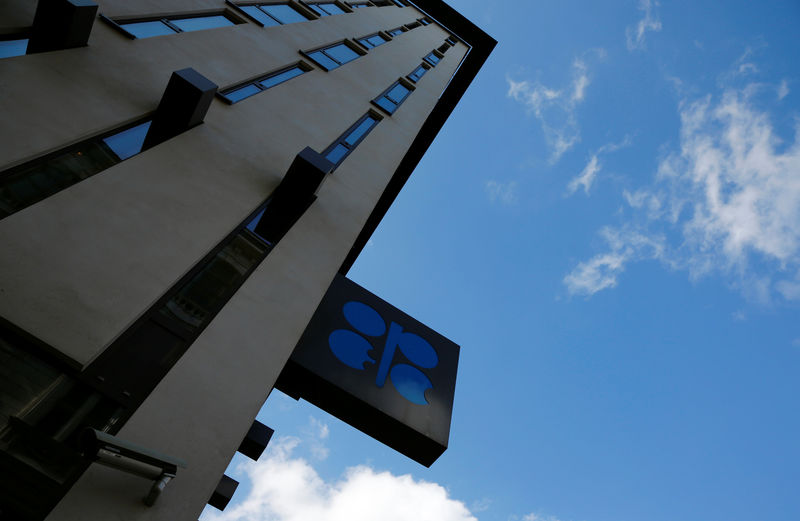(Bloomberg) -- It was meant to be the week when OPEC nations gathered in Baghdad to celebrate the cartel’s six decades as a dominant force in global oil markets.
Instead, the Organization of Petroleum Exporting Countries and its allies will convene online, and reflect on whether the coranavirus has thwarted their best efforts to keep the market afloat.
After reviving crude prices from an unprecedented collapse over the spring, OPEC+ is seeing the recovery stall and fuel demand falter as the deadly pandemic surges once again. Prices slipped below $40 a barrel last week for the first time since June.
On Thursday, Saudi Arabia and Russia -- the leading members of the alliance -- will chair a monitoring meeting to assess whether the vast production cuts, which they started easing in August, are still staving off an oil glut. New signs of exporters reneging on the deal aren’t helping.
“There were some major assumptions built in on where demand and the recovery would be now, and it just hasn’t happened,” said Mohammad Darwazah, an analyst at research firm Medley Global Advisors LLC. “If I’m OPEC and if I’m Saudi Arabia, I would be concerned.”
The relapse is a source of acute financial distress for OPEC nations, from poorer members like Nigeria and Venezuela -- who need crude prices far above current levels to cover government spending -- all the way up to wealthy Gulf monarchies like Kuwait.
Riyadh and Moscow had anticipated that a resumption in global economic activity, combined with the supply curbs, would sharply deplete the hoard of surplus oil inventory accumulated during lockdowns. But there are growing signs the market isn’t tightening so fast.
READ: Julian Lee on the “chill wind” rattling through oil markets.
The peak holiday driving season has passed in the U.S., yet rush-hour traffic is still sparse and crude inventories stubbornly high. In India, the third-biggest consumer, transport-fuel sales remained 20% below year-ago levels last month. Even in China, where refiners binged on crude at the height of the crisis, buying has slowed.
Trading houses are hiring oil tankers on long-term contracts once again to store surplus barrels.
The downturn isn’t yet severe enough for OPEC+ to reimpose the full output cutbacks made in the second quarter, according to Helima Croft, head of commodity strategy at RBC Capital Markets LLC. After tapering the cuts last month from 9.7 million barrels a day to 7.7 million, a sense of inertia means there will be a “high bar” for any new action, she said.
“For the men who reside in the palaces and the presidential halls, there is a price at which they make a panicked phone call,” said Croft. “The question is, what is the price?”
In theory, OPEC’s task should get easier next quarter as demand for winter fuels kicks in and a gradually mending global economy rekindles the need for road and aviation fuels, data from the International Energy Agency in Paris shows.
Strong Statement
But as the outlook continues to darken, the Saudis may choose to underscore their readiness to act.
“We expect a strong statement that if markets continue to weaken, the producer group will be prepared to trim output further,” said Ed Morse, head of commodities research at Citigroup Inc (NYSE:C).
In the meantime, the kingdom will press on with its mission to enforce rigorous implementation of the curbs.
Saudi Energy Minister Prince Abdulaziz bin Salman has achieved an unusual degree of success in this area, bringing habitual quota-violators like Iraq and Nigeria to heel by assigning them “compensation cuts” to make up for earlier cheating.
The two countries have so far implemented only a fraction of those extra curbs, and Baghdad is expected to seek more time to deliver the rest. Nonetheless, the punishment itself has apparently spurred them to previously unseen levels of compliance with the original quotas.
Just as they toe the line, Riyadh is encountering a new challenge from an unexpected quarter. The United Arab Emirates, traditionally a staunch ally, has admitted to flouting its limits by roughly 20%, while promising to correct the error. Export data from consultants like Petro-Logistics SA and Kpler SAS indicate the UAE’s transgression could be many times bigger.
The Saudis will likely to try discreetly address the misbehavior of their Gulf partner, which for now appears a minor blemish in an otherwise well-executed strategy, said RBC’s Croft. The bigger issue is whether OPEC+ responds promptly enough if the deterioration in oil demand continues.
“Judged on compliance, I think they could take a victory lap,” she said. “The real challenge is -- is the organization nimble enough? If this really does stall out, how fast can they react?”
©2020 Bloomberg L.P.
